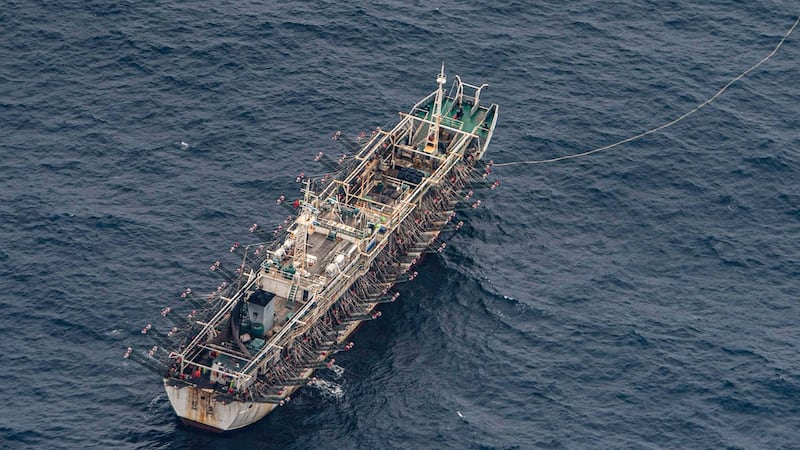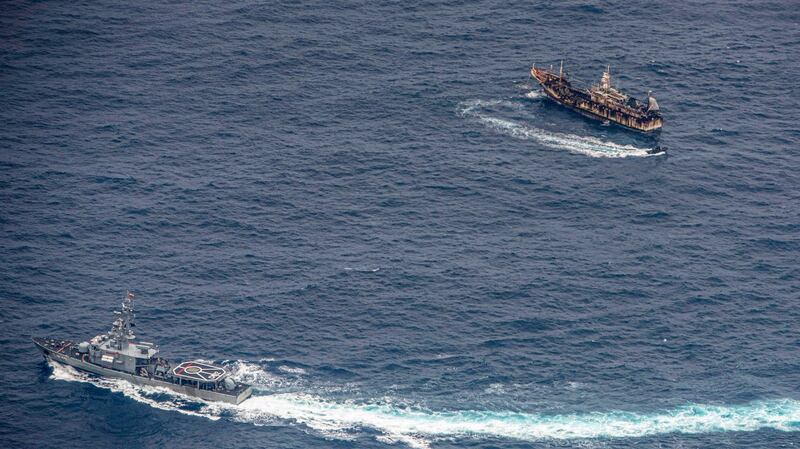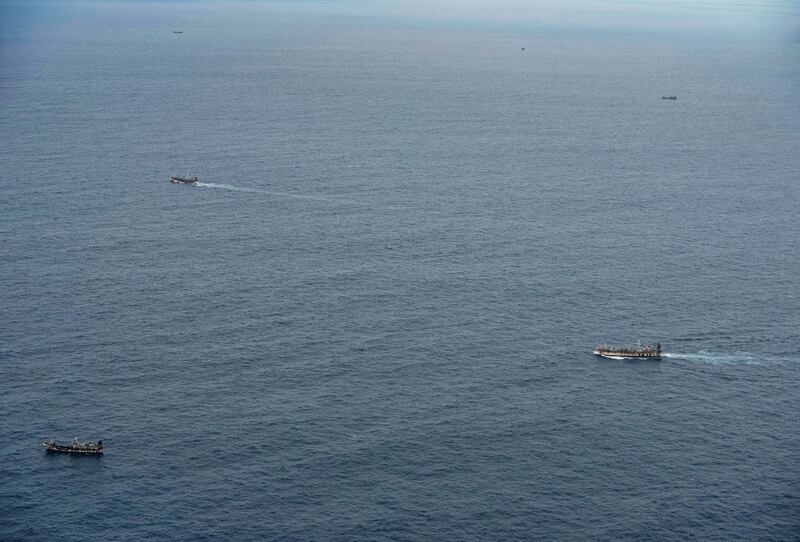A Chinese fishing armada that has shown up off the northwestern coast of South America has stunned several governments there.
The fishing fleet’s arrival has become an annual event.
But most remarkable this year has been the huge catch that the Chinese boats have been hauling in, according to reports appearing in British media, including The Guardian newspaper, the BBC, and the Daily Mail.
The boats are focusing on a zone rich in fish and squid near Ecuador’s Galapagos Islands, which had inspired Charles Darwin’s theory of evolution.
Nearly 300 Chinese vessels accounted for more than 90 percent of visible fishing vessels operating just outside the Galapagos archipelago’s waters between July 19 and August 13 of this year.
This estimate was made in an analytical report done by the marine conservation group OCEANA, which is based in Washington, D.C.
Other reports place the number of ships in the fleet at roughly 260 vessels.
The Galapagos Islands are located some 600 miles off Ecuador’s coast.
The fleet has been fishing primarily for squid, which is essential to the diet of the unique Galapagos fur seals and endangered scalloped hammerhead sharks.
The ships were also hauling in commercial fish species such as the tuna which contribute to the local economy, according to the OCEANA report.
OCEANA used a mapping tool provided by the NGO Global Fishing Watch, which worked with the environmental watchdog Sky Truth, to document the location of the Chinese ships.
But the Chinese vessels apparently disabled their public tracking services, according to The Guardian, thus providing conflicting vessel identification information.
“This massive and ongoing fishing effort of China’s fishing fleet threatens the Galapagos Islands, the rare species that only call it home, and anyone who depends on it for food and livelihoods,” said Maria Valentine, an illegal fishing analyst for OCEANA.
These annual fishing fleet visits go back several years.

The Reuters news agency reported at the end of August 2016 that Ecuador had jailed 20 Chinese fishermen for up to four years for illegally fishing off the Galapagos Islands, where they were caught with some 6,600 sharks.
Their vessel contained some 300 tons of near-extinct or endangered species, including hammerhead sharks.
According to the Daily Mail, a campaign in Ecuador to protect marine life may have found its figurehead: Hope, a whale shark given a GPS tracker and that name by conservationists last year, recently vanished. It was last traced to an area where the Chinese fishing fleet was operating.
China’s loans to Ecuador
“The Ecuador government seeks to pay off its debts to China by giving it the Galapagos,” claims an online petition that has garnered thousands of signatures in Ecuador.
Local critics such as these suspect that infrastructure loans provided to Ecuador by China as part of China’s massive Belt and Road Initiative greatly increase China’s power and influence in Ecuador and place restraints on the country’s ability to challenge the offshore Chinese fishing fleet.
Ecuador sells oil to China. But since 2008 Ecuador has borrowed more than $11 billion from China, much of it used for infrastructure as well as for oil, mining, and energy projects.
And because the Chinese fleet is operating in international waters near the Galapagos rather than within the country’s Exclusive Economic Zone (EEZ), Ecuador’s options may be limited.
In the past, Chinese officials have insisted that China is “a responsible fishing nation” with “zero tolerance toward illegal fishing.”
The Ecuador government appears to some as willing to accept such assurances.

Ecuador government actions
But according to the BBC, Ecuador’s President, Lenin Moreno, plans to hold consultations with Columbia, Peru, Chile, Panama, and Costa Rica in order to confront the fishing fleet threat.
Ecuador, a mostly Spanish speaking nation of 17.1 million people, straddles the equator of South America’s west coast. It borders Columbia to the north, Peru to the east and south, and the Pacific Ocean on the west.
Driven in part by a growing Chinese middle class’s demand for fish at home, China’s fishing boats now range thousands of miles from home.
Here’s the downside: China’s fishing fleet, which reaches as far as Latin America, West Africa, and even Antarctica, is reported to be adding to a worldwide strain on fish stocks.
This is a conclusion reached by experts and nongovernmental organizations monitoring the issue.
Meanwhile, it’s no surprise that Chinese fishermen have been involved in clashes with foreign fishermen and coast guards at great distances from their homeland.
In perhaps the most dramatic clash in South America, which occurred in March of 2016, Argentina’s coast guard sank a Chinese trawler that was fishing within the country’s territorial waters more than 11,000 miles from its home.
Adding insult to injury this year, Chinese seamen have been tossing empty, Chinese-labelled plastic bottles into the waters near the Galapagos.
The Daily Mail says that the bottles ruin the islands' pristine beaches.
Experts believe that Chinese fishermen throw some 25,000 bottles overboard every day. They are said to threaten the Galapagos’s iguanas, tortoises, and fish, all of which may mistake them for food.
They sometimes consume the plastic or get entangled in it.
Local Ecuadorian fishermen are keeping a record of the plastic that they find. They hope that they can make compensation claims in the future against those responsible.
In conclusion, can we expect China to modify the behavior of its fishing fleet in light of protests from fishermen in several Latin American countries?
At this point, it looks unlikely.
In answer to a query from this commentator, Evan Ellis, a research professor of Latin American Studies at the U.S. Army War College Strategic Studies Institute in Carlisle, Pa., provided a few wrap-up comments on the subject.
Ellis began by noting that “the Chinese Communist Party monitors and controls every part of the political, social, and economic behavior of its citizens” but acts differently when it comes to controlling its fishing ships.
“The fact that the People’s Republic of China looks the other way,” he said, “while its fishing ships and companies ravage the world with wanton disregard is a reminder of why we must fight for a world in which values, human rights, and the rule of law survive.”

Dan Southerland is RFA's founding executive editor.
